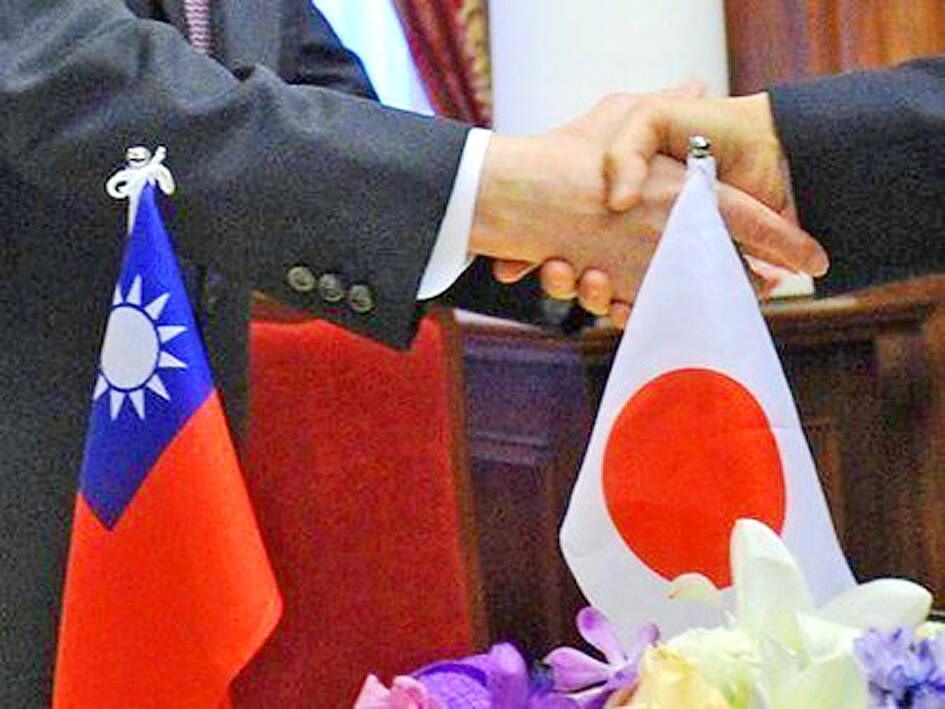Seventy percent of Japanese view Taiwan as an independent country and support establishing formal diplomatic relations between the nations, a poll published yesterday by a Taipei-based think tank showed.
The Indo-Pacific Strategic Think Tank (IPST) worked with the Japanese Sankei Shimbun’s polling company to conduct a survey on Japanese public opinion of Taiwan and cross-strait relations.
The survey showed that 71.1 percent of Japanese respondents said they support establishing diplomatic ties with Taiwan, 71.2 percent view Taiwan as an independent nation and 55 percent feel closest to Taiwan among nine Asian countries.

Photo: CNA
When asked which person most represents Taiwan, 53.8 percent chose late singer Teresa Teng (鄧麗君), followed by retired baseball star Kuo Tai-yuan (郭泰源), who pitched for Japan’s Seibu Lions from 1985 to 1997, at 18.6 percent and late president Lee Teng-hui (李登輝) at 16.7 percent.
Four percent of respondents said President William Lai (賴清德), the poll showed.
Regarding cross-strait relations, only 8.2 percent of participants said they viewed Taiwan as part of China and 20.6 said they were unsure about the issue.
Fifty percent said they believe that a war would not occur in the next decade, 23.6 percent think conflict is likely and 26.4 percent remain neutral, the poll showed.
On late Japanese prime minister Shinzo Abe’s statement that “a Taiwan contingency is a contingency for Japan,” 38.3 percent said they supported it, 30 percent opposed it and 31.8 percent did not reply either way, it showed.
If a conflict were to break out, 52.1 percent said they expected that the US would support, but not directly intervene, 39.1 percent expect a US intervention and 8.9 percent believe the US would not assist Taiwan.
As for Japan’s role in a hypothetical conflict, 46.6 percent of respondents said they believed Japan should provide legally permissible support, 41.4 percent support economic sanctions and 12 percent believe Japan should not intervene at all, the poll showed.
The survey found that 40.6 percent of respondents said they believe Japan should bolster economic engagement with Taiwan, while 26.7 percent said they prefer prioritizing security cooperation, 16.1 percent support emphasizing cultural exchanges and 10.2 percent prefer focusing on political relations.
Regarding what they like and dislike most about Taiwan, the majority said they liked Taiwan’s proximity to Japan and the friendliness of Taiwanese, such as how it assists Japan during natural disasters, while 53.8 percent cited Taiwan’s chaotic traffic as a major drawback, the poll showed.
The survey was conducted on Sept. 21, with more than 3,000 adult respondents from eight major cities, IPST said, adding that the poll consisted of 14 single-choice questions, asked over the telephone.
The IPST is a new research organization founded by Taipei-based political commentator Akio Yaita that takes inspiration from Abe’s Indo-Pacific Strategy to highlight Taiwan’s democratic freedoms and its strategic importance to regional peace and stability.

Intelligence agents have recorded 510,000 instances of “controversial information” being spread online by the Chinese Communist Party (CCP) so far this year, the National Security Bureau (NSB) said in a report yesterday, as it warned of artificial intelligence (AI) being employed to generate destabilizing misinformation. The bureau submitted a written report to the Legislative Yuan in preparation for National Security Bureau Director-General Tsai Ming-yen’s (蔡明彥) appearance before the Foreign Affairs and National Defense Committee today. The CCP has been using cognitive warfare to divide Taiwanese society by commenting on controversial issues such as Taiwan Semiconductor Manufacturing Co’s (TSMC, 台積電) investments in the

INVESTIGATION: The case is the latest instance of a DPP figure being implicated in an espionage network accused of allegedly leaking information to Chinese intelligence Democratic Progressive Party (DPP) member Ho Jen-chieh (何仁傑) was detained and held incommunicado yesterday on suspicion of spying for China during his tenure as assistant to then-minister of foreign affairs Joseph Wu (吳釗燮). The Taipei District Prosecutors’ Office said Ho was implicated during its investigation into alleged spying activities by former Presidential Office consultant Wu Shang-yu (吳尚雨). Prosecutors said there is reason to believe Ho breached the National Security Act (國家安全法) by leaking classified Ministry of Foreign Affairs information to Chinese intelligence. Following interrogation, prosecutors petitioned the Taipei District Court to detain Ho, citing concerns over potential collusion or tampering of evidence. The

‘COMPREHENSIVE PLAN’: Lin Chia-lung said that the government was ready to talk about a variety of issues, including investment in and purchases from the US The National Stabilization Fund (NSF) yesterday announced that it would step in to staunch stock market losses for the ninth time in the nation’s history. An NSF board meeting, originally scheduled for Monday next week, was moved to yesterday after stocks plummeted in the wake of US President Donald Trump’s announcement of 32 percent tariffs on Taiwan on Wednesday last week. Board members voted to support the stock market with the NT$500 billion (US$15.15 billion) fund, with injections of funds to begin as soon as today. The NSF in 2000 injected NT$120 billion to stabilize stocks, the most ever. The lowest amount it

NEGOTIATIONS: Taiwan has good relations with Washington and the outlook for the negotiations looks promising, Minister of Economic Affairs J.W. Kuo said Taiwan’s GDP growth this year is expected to decrease by 0.43 to 1.61 percentage points due to the effects of US tariffs, National Development Council (NDC) Minister Paul Liu (劉鏡清) said at a meeting of the legislature’s Economics Committee in Taipei yesterday, citing a preliminary estimate by a private research institution. Taiwan’s economy would be significantly affected by the 32 percent “reciprocal” tariffs slapped by the US, which took effect yesterday, Liu said, adding that GDP growth could fall below 3 percent and potentially even dip below 2 percent to 1.53 percent this year. The council has commissioned another institution